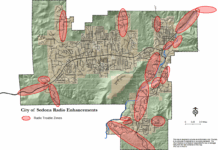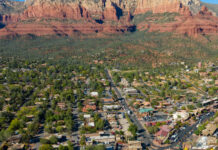Sedona has a long way to go to achieve zero waste.
Yet, more than 100 mayors in other cities across the United States have committed to reaching that goal by the year 2040 or earlier, according to the Institute for Local Self Reliance.
That’s 10 years after the United States, if left unchecked, will reach an output of 9.7 gigatons of carbon dioxide equivalent, according to a report issued by ILSR earlier this month.
By Susan Johnson
Larson Newspapers
Sedona has a long way to go to achieve zero waste.
Yet, more than 100 mayors in other cities across the United States have committed to reaching that goal by the year 2040 or earlier, according to the Institute for Local Self Reliance.
That’s 10 years after the United States, if left unchecked, will reach an output of 9.7 gigatons of carbon dioxide equivalent, according to a report issued by ILSR earlier this month.
Findings in a related report, titled “Stop Trashing the Climate,” concluded that “a zero waste approach is one of the fastest, cheapest and most effective strategies that can be used to protect the climate and the environment.”
To help the city, its businesses and its residents move in that direction, Barbara Litrell, president of Keep Sedona Beautiful announced that KSB is sponsoring a Zero Waste Workshop on Saturday, June 21, from 9 to 11:30 a.m. at 360 Brewer Rd.
“This is our third Environmental Issues Workshop, a series designed to spotlight environmental issues in the Sedona/Verde Valley area that either are or will affect our quality of life and the future of this beautiful area,” Litrell said. “Our goal is to give people information and resources to begin working on these issues.”
Marlene Rayner, president of the Sierra Club-Sedona Verde Valley Group and a member of SCSVVG’s zero waste committee, will address what problems Sedona currently faces regarding waste and how these problems can best be addressed.
Rayner is a research scientist who specialized in microbiology, biochemistry and virology at E.I. du Pont de Nemours where she developed drug tests used to combat HIV/AIDS.
Her involvement with the Sierra Club began during the Carter administration and escalated after her retirement in 2003.
“My goal, ultimately, is to get the city to commit to a resolution that calls for adopting a zero waste ethic,” Rayner said. “And to implement its means and methods over the next 10 years.”
According to Rayner, there are many small, easy changes that individual residents can make that would add up to a large impact.
Using a clothesline is a simple switch that avoids using energy.Reuse of gray water, composting and recycling are other strategies that were once commonly employed, but are no longer.
“I think what we’ve got now is a generation of people who have no connection to these [behaviors],” Rayner said.
On a larger scale, Rayner would like to see Sedona’s Wastewater Plant capture methane from its operations.
“It would run the plant and save the city money in the process,” Rayner said.
The city is already looking at sustainable ways to handle its biosolids, according to Pat Livingstone, director of the city’s wastewater plant.
“One of the options under consideration is anaerobic digestion to generate methane to help power the plant,” Livingstone said. “Engineering data indicate that a plant needs to process at least five million gallons a day to be feasible, but we’re only treating one million gallons a day at present.”
However, Livingstone also explained that the plant’s current process generates no appreciable amount of methane.
“Our process is aerobic — aerobic bacteria break down the contaminants in the presence of oxygen and produce carbon dioxide,” Livingstone said. “Methane is generated in a totally different process called anaerobic (absence of oxygen)…converting the organic contaminants to methane.”
Many other zero waste options are available to the city, with the following outlined in the ILSR report:
n Establishment and implementation of national, statewide and municipal zero
waste targets.
n Stop construction of new landfills.
n Place a per-ton surcharge on landfilled materials.
n Ban organic materials from landfills.
n Create incentives for locally based reuse, recycling and composting jobs.
n Adopt pay-to-throw fees for trash.
n Place responsibility for products and packaging on manufacturers.
n Regulate single-use products that have no recycling value.
n Significantly increase paper recycling.
The workshop is free and open to the public.
Susan Johnson can be reached at 282-7795, Ext. 129 or e-mail sjohnson@larsonnewspapers.com





















